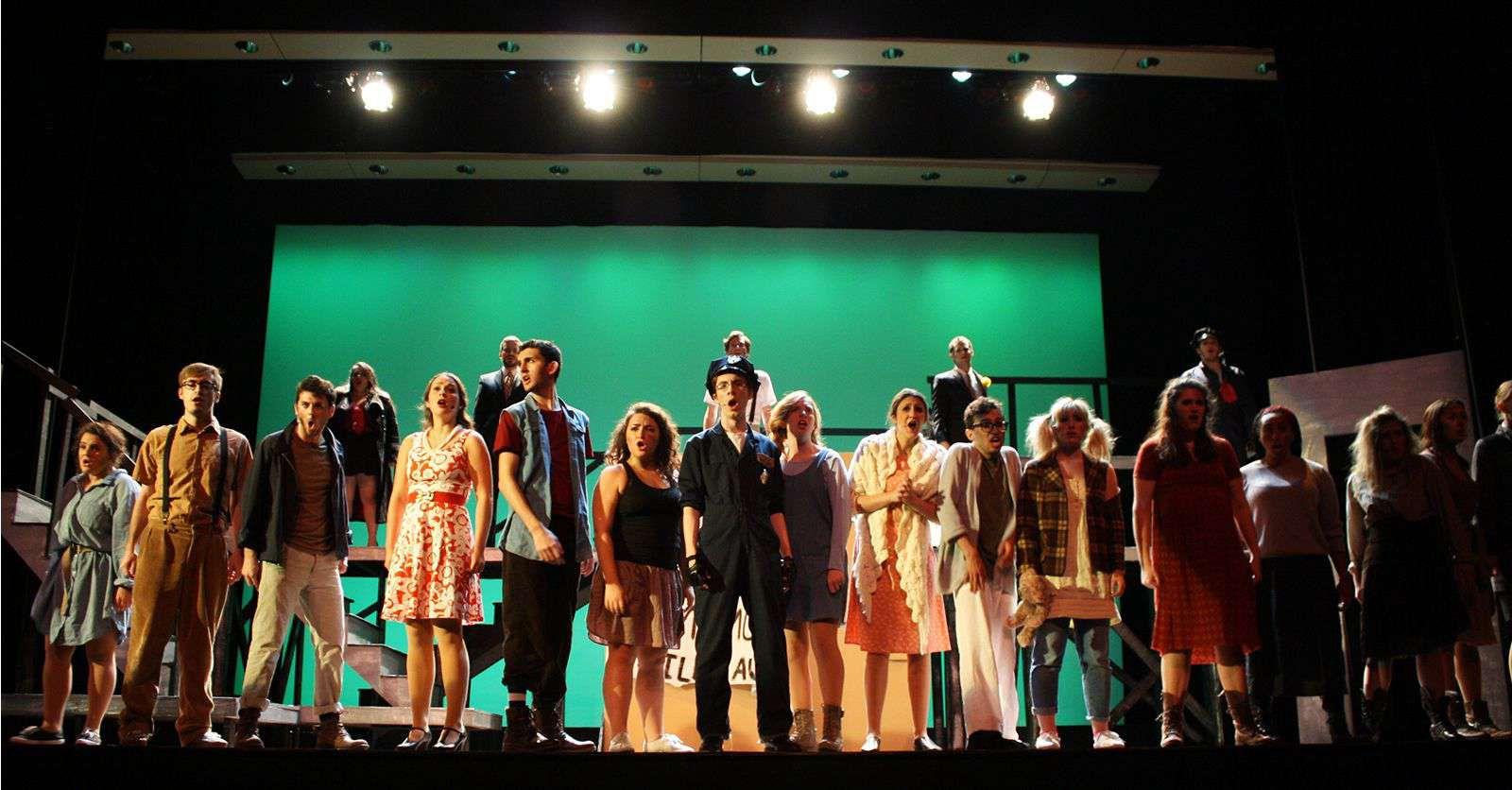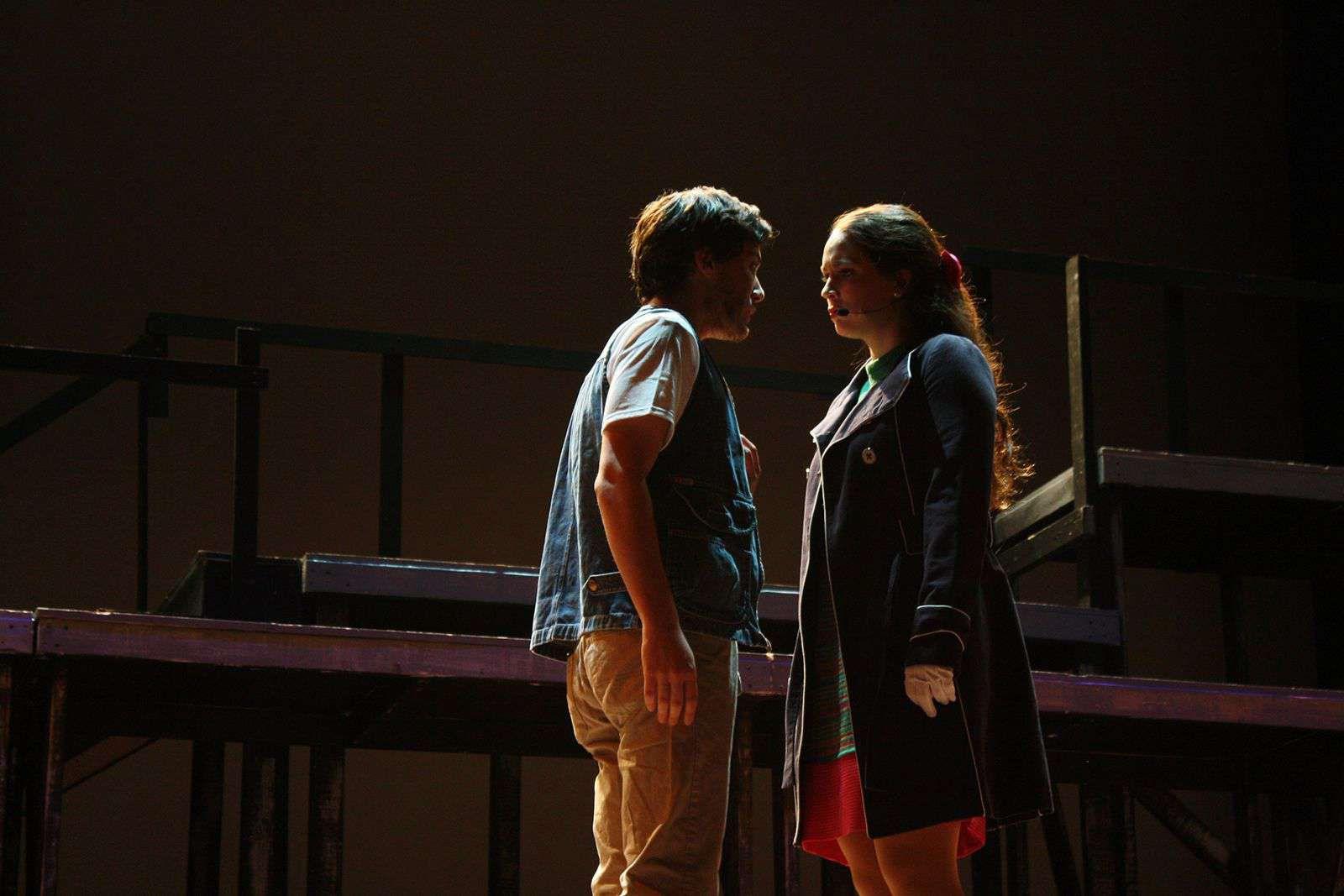Urinating on something is an age-old method of showing insult. In a similar — and more playful — way, “Urinetown: The Musical” mocks and tears apart the traditional model of musical theater by paying sarcastic and overdramatic homage to it. Boston University On Broadway’s production of playwright Greg Kotis and lyricist Mark Hollmann’s “Urinetown,” which ran at Tsai Performance Center Nov. 6 to 8, definitely lived up to the musical’s name, putting on a hilarious yet thought-provoking performance.
Directed by Amir Feinberg, “Urinetown” is a satirical musical about a town where all residents must “pay to pee.” A 20-year drought has led to Great Depression-like times and in order to regulate the water shortage, private toilets have been outlawed. Instead, all residents must use public amenities owned by Urine Good Company (UGC), a corrupt corporation run by the greedy Caldwell B. Cladwell (David Olson).

The musical opens with narrator Officer Lockstock (Jarrett Kleitz) welcoming the audience to Urinetown — “not the place, the musical.” He repeats this so much throughout the show that it becomes not only funnier each time, but also less believable. Urinetown the place is a mysterious location where residents are sent if they do not pay their amenity fee or if they urinate publicly. In essence, it’s a fear tactic and a tool of power.
The poorest of the poor must use the dingy Public Amenity #9, run with an iron fist by Penelope Pennywise, played by BU on Broadway President Caitlin Donohue. How could a musical dramatize something like peeing? Donohue pulls it off spectacularly, with her powerfully and beautifully sung rendition of “It’s a Privilege to Pee,” explaining how water is worth its weight in gold ever since the reservoirs dried up.
Bobby Strong (Jordy Shulman) works at Public Amenity #9 and is ridden with guilt after his father is sent to Urinetown for public urination. He meets the beautiful Hope Cladwell (Mary Kate Heagerty), who makes his cold heart feel better. He falls in love with her, unaware that she is a Cladwell. These two events spark Bobby’s decision to start a revolution for freedom and the right to pee for free.
Lockstock, who narrates directly to the audience, brings a great meta-musical vibe to “Urinetown.” He and poor orphan Little Sally (Meaghan Collins) often talk aside from the rest of the cast about aspects of the musical and subtly make fun of themselves, the musical and the audience. “Why not hydraulics?” Little Sally asks Lockstock as they discuss the musical’s singular focus on toilets.
Perhaps nothing illustrates the musical’s breaking of traditional rules and conventions like Bobby and Hope’s duet, “Follow Your Heart.” As they fall in love, they tell each other to listen to their hearts — literally, comically putting their ears on each other’s chests and straining to hear. “Even your heart is telling you to follow your heart!” Hope exclaims. The song expertly and sarcastically makes fun of the cheesy Broadway musical, with its broad and vaguely inspirational lyrics and gestures.
This is furthered by the outrageous variety of musical song-and-dance styles the show employs, imitates and mocks (it becomes hard to discern the difference). The play’s first song immediately breaks the barrier between the story and the audience, but is sung in a sophisticated and harmonious way reminiscent of dramatic musicals. Later, “Mr. Cladwell” is sung and performed in a 1940s show-tune style, and the musical later even includes gospel-inspired performances.
As sarcastic as they may be, the songs are quite catchy. Once Bobby finds out that Hope is Cladwell’s daughter, he decides he must kidnap her so Cladwell will bow to the revolution. While she is held hostage, the ensemble launched into a dark, excessively snappy and swinging rendition of “Snuff That Girl.” It is purposely out of place, but completely infectious, due to the impressive choreography by Abby Bornstein.

Throughout the play, Bobby acts in a comically dramatic manner that is somehow both ridiculous, yet still believable. The actors deftly build off of one another’s silly, over-the-top antics in a way that feeds into the show’s multi-layered humor. One of the strengths in this production lies in its dedication to the mockery.
Most great humor has at least a sliver of truth to it, and the plot of “Urinetown” has quite a few slivers. Despite mocking traditional musical models, Urinetown’s humor is steeped in philosophical and ideological conflict on issues of politics and Malthusian theories of human nature and the effects of overpopulation. When Hope joins the revolution, her father explains that he used to believe in the same ideals as her, but realized there were more important things than love and freedom, because “worldwide ecological devastation has a way of changing a man.”
“Urinetown” was written in 2001, but BU On Broadway’s performance illustrates that the themes of the musical are perhaps even louder and more important today, as global climate change and natural resources become more and more hotly debated issues.
The ending, then, leaves one slightly stumped. The people of Urinetown seem no better off after the revolution than before, and it is difficult to tell in which case the people were “better off,” to what extent the plans of both the politicians and the urinary revolutionaries were wrong. One leaves the musical debating the right way — economically, philosophically and morally — to control such issues as greed, overpopulation and climate change, while simultaneously humming something catchy about a privilege to pee.






























































































































